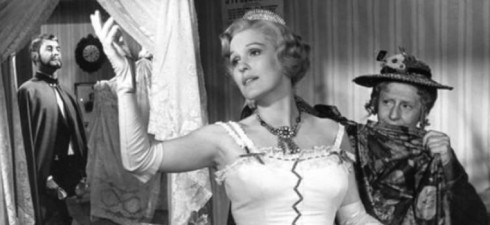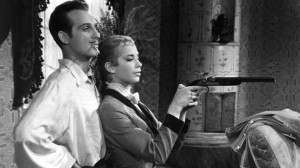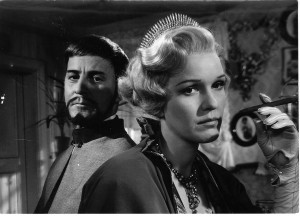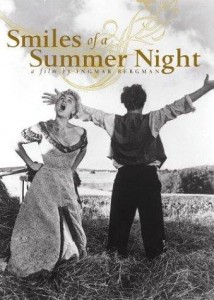Although best known for “The Seventh Seal” and other serious “art house” films, I suggest Ingmar Bergman’s best work is his delightful “Smiles of a Summer Night.” Whether you watch it as a momentary diversion from a sweltering evening this summer or view it as an enduring image of the Magnum Mysterium that is marriage, I think you’ll agree that rarely has the battle of the sexes been displayed with more charm, wit or verve than in this uncharacteristic near farce from the otherwise somber Swede.
They all end up at the house of Desiree’s mother for a weekend party where Charlotte seduces Frederik which induces jealousy in Malcolm to win him back from Desiree, while young Anne discovers a love for young Henrik, even as Petra rolls in the hay with Frid. In order to deal with his competition, Count Malcolm challenges Frederick to a game of Russian Roulette which Frederik loses but survives since the gun is loaded only with blanks.
In Bergman’s comedic love skirmishes the females possess the superior technology and they conduct campaigns of shock and awe against the males. As the Von Clausewitz of sex, Desiree articulates this marital/martial philosophy on the stage as an actress in the play within the movie, perhaps not so subtly summarizing Bergman’s theories of amore. Although Desiree steals the husbands of other women for a mere dalliance or two, she always returns them in better shape than she found them, more tender lovers, more faithful husbands and more exemplary fathers.
According to Desiree, the skill to learn is to handle a man’s . . . dignity . . . as a favorite toy or to gently lay it down to sleep. “Love is a perpetual juggling of three balls: heart, words, and loins. How easy it is to juggle these balls, and how easy it is to drop one of them,” she says. In Bergman’s cinematic worldview, men are the delicate sex. Although we can’t condone Desiree’s philosophy of borrowing and returning husbands like library books, we can perhaps learn something about the male psyche, especially in middle age crisis, from her monologue. As illustrated at the end of the film, humiliated by the loss of his youthful wife to his son, Frederik must now rely upon the skillful juggling of Desiree to catch his dignity before it is dashed on the floor, to assist Frederik in his return to an age appropriate relationship.
What romantic battle movies are your favorites? Which ones have helped you wage your own war on love?





I love this. It makes me want to see the movie, and figure out just how it is to assist one in a middle age crisis “to return to an age appropriate relationship.”
My favorite romantic battle movies? Well, Gone With the Wind, of course. I’m always wondering if I will wake up too late to the one who loved me all along.. And then Breakfast at Tiffany’s.. I don’t want to identify with Holly Golightly, but I do, but I don’t. If you know what I mean.
This makes me want to watch ‘Smiles of a Summer Night’, too… Bergman’s influence on Woody Allen (and how many others?) is acknowledged… and this movie seems to be a strong point of connection with his style and subject.
Can’t resist mentioning Stephen Sondheim’s waltz-y musical adaptation of Bergman’s film, A Little Night Music, which is how many theater dorks like me became acquainted with Smiles of a Summer Night. :-)
SLK — me too! One of Sondheim’s best I think.
@Cheryl, I get the Breakfast at Tiffanies comment.
@Andy, I think Allen’s Mid-Summer Night’s Sex Comedy was largely homage/rip off of SSN.
@SLK, I didn’t know that–I want to check it out.
Ed, you may already know one song from the musical: “Send In the Clowns,” which is Desirée’s big Act II number (and, in context, has a lot of irony/poignancy not present in the over-exposed pop versions).
Favorite Romantic Battle Movies:
The Philadelphia Story
The Shop Around the Corner
Moonstruck (I have a Cher weakness. Or strength?)
The Great Race
His Girl Friday
When Harry Met Sally
Annie Hall
Room With a View
It Happened One Night
Also, hard to beat the sparring in Charade or To Catch a Thief, although they aren’t romantic films.